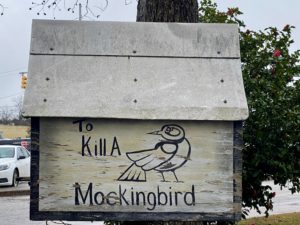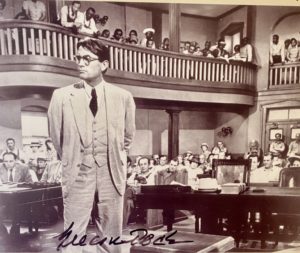 Even though I’ve always been considered a nerd, there are very few books I remember reading from childhood. A Room for Cathy by Catherine Whoolley, because I finished it in one evening to win a contest in fifth grade. Great Expectations by Charles Dickens, because it was a laborious assignment for my freshman honor’s English class. Note: It didn’t start getting good (from my fourteen-year-old’s perspective) until just at the end when Miss Havisham’s ancient wedding dress caught fire (with her in it). Lord of the Flies by William Golding and To Kill a Mockingbird by Harper Lee.
Even though I’ve always been considered a nerd, there are very few books I remember reading from childhood. A Room for Cathy by Catherine Whoolley, because I finished it in one evening to win a contest in fifth grade. Great Expectations by Charles Dickens, because it was a laborious assignment for my freshman honor’s English class. Note: It didn’t start getting good (from my fourteen-year-old’s perspective) until just at the end when Miss Havisham’s ancient wedding dress caught fire (with her in it). Lord of the Flies by William Golding and To Kill a Mockingbird by Harper Lee.
It was my sophomore year of high school when my English class was given the assignment to choose to read either Lord of the Flies or To Kill a Mockingbird. I chose  Mockingbird. The story engrossed me so much, I finished it in only a couple of days. I felt pretty proud of myself completing the two-week assignment in record time only to then have my teacher, Mrs. Robinson, strongly suggest I also read Lord of the Flies.
Mockingbird. The story engrossed me so much, I finished it in only a couple of days. I felt pretty proud of myself completing the two-week assignment in record time only to then have my teacher, Mrs. Robinson, strongly suggest I also read Lord of the Flies.
As an incentive, Mrs. Robinson rewarded us by bringing in the movies based on the books for us to view in the classroom. I became just as enamored with the movie To Kill a Mockingbird as I was the book. Not an easy feat. From the opening credits as a child hums and draws a mockingbird to the end when Scout takes Boo Radley’s hand, I was enthralled. Since that time, Atticus Finch has stood out as a true hero—and I will forever have a soft spot for Gregory Peck. Note: If you like Mockingbird, another great movie starring Gregory Peck is A Gentleman’s Agreement.
 No other book I have ever read (or movie I’ve ever seen) has had the same impact on me. In my mind, Atticus Finch will always be the ultimate hero—a humble man who stands in the face of bigotry, ignorance, and evil to do the right thing. It astounded me then (and now) that a jury of people could ultimately make a choice to end a man’s life merely because of his skin color. This book covered gossip, prejudice, poverty, and a culture of class distinctions that meant nothing beyond the world they lived in. There were so many life lessons for me that came from Mockingbird, it would take much more than a blog post to expound on them.
No other book I have ever read (or movie I’ve ever seen) has had the same impact on me. In my mind, Atticus Finch will always be the ultimate hero—a humble man who stands in the face of bigotry, ignorance, and evil to do the right thing. It astounded me then (and now) that a jury of people could ultimately make a choice to end a man’s life merely because of his skin color. This book covered gossip, prejudice, poverty, and a culture of class distinctions that meant nothing beyond the world they lived in. There were so many life lessons for me that came from Mockingbird, it would take much more than a blog post to expound on them.

I take a moment to read over Scout’s shoulder while Dill and Jem look on.
It wasn’t until a few years ago, when we moved to Tennessee from California, that I learned the town of Monroeville, Alabama—just a hop, skip, and a jump from where we now live—was the home of Harper Lee and Truman Capote (who inspired the character of Dill in the book). It was then I also learned that though Maycomb, Alabama (the setting for the book) was a fictional town, it was actually based on Monroeville.
Just last week, Chris and I were driving through Alabama to spend a few days at Orange Beach soaking up a little warmth, and we passed the off-ramp for Monroeville. I hadn’t realized until then how close we were.
“Can we go on our way home?” I asked Chris, like a kid begging to visit Disneyland. How could he refuse?
 On our return trip, we detoured to Monroeville. The courthouse where Harper Lee’s father tried cases still stands in town square. A newer courthouse was built on a different sight in 1963, but they turned the old one into a museum. The actual courtroom looks exactly as it did more than eighty years ago. It was replicated for the movie, so when we walked in, I half expected to see Atticus Finch and Tom Robinson sitting at the table up front with Scout, Jem, and Dill peering over the balcony.
On our return trip, we detoured to Monroeville. The courthouse where Harper Lee’s father tried cases still stands in town square. A newer courthouse was built on a different sight in 1963, but they turned the old one into a museum. The actual courtroom looks exactly as it did more than eighty years ago. It was replicated for the movie, so when we walked in, I half expected to see Atticus Finch and Tom Robinson sitting at the table up front with Scout, Jem, and Dill peering over the balcony.
Years ago, I purchased the black and white DVD movie (never the colorized version) and  have watched it so many times, I could almost quote it line for line. When we arrived home, I popped it into the DVD player, and we watched it once again. After all these years, Atticus Finch’s courtroom monologue has not lost any of its power, and when Tom Robinson is unfairly found guilty, it pierced my heart just as it did the first time.
have watched it so many times, I could almost quote it line for line. When we arrived home, I popped it into the DVD player, and we watched it once again. After all these years, Atticus Finch’s courtroom monologue has not lost any of its power, and when Tom Robinson is unfairly found guilty, it pierced my heart just as it did the first time.
 I am well aware that To Kill a Mockingbird is a work of fiction, and Atticus Finch wasn’t a real man, but the story epitomizes so much of which our culture has lost sight. There continues to be a wider and wider gap between good and evil, and so often those lines get blurred. Sometimes, it’s just nice to believe in the fairy tale, if even for a few hours.
I am well aware that To Kill a Mockingbird is a work of fiction, and Atticus Finch wasn’t a real man, but the story epitomizes so much of which our culture has lost sight. There continues to be a wider and wider gap between good and evil, and so often those lines get blurred. Sometimes, it’s just nice to believe in the fairy tale, if even for a few hours.






Comments 3
How amazing. That is one of my favorite books. To be able to go to those areas would be thrilling.
HUGS
It is a shame that Lord of the Flies and To Kill a Mockingbird are on censure lists for many schools now as well as many other books that are classics.
Author
It is. It’s a shame that so much of our history is being “changed” for reasons I really don’t understand.